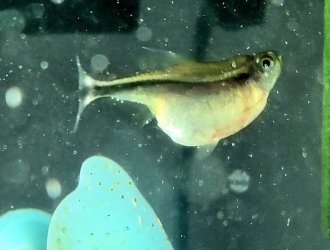sweeteybabey
New Member
So my black neon tetra has become very bloated (I've attached some photos). She's still swimming and eating fine, and she isn't separating herself from the fish which is good! I suspect it may have been due to me feeding her flakes, but I've now switched to micro pellets.
The neon has been bloated for around four days now, I've fasted her for three days and fed her a blanched pea yesterday. She's not losing the bloat which is worrying me.
- Should I keep feeding peas instead of pellets? Or is that worse for her?
- Can I add Epsom salt into the main tank (with corys, otos, and plants) instead of taking her out for baths - which would stress her out more?
I posted on Reddit about this but all of the replies I got were criticisms about my tank, which I'm very aware of (quite high nitrate despite it being 30ppm for a year now because of my tap water and tank size - which I will be upgrading). I'm only a teenager so I can't spend a lot of money right now upgrading my tank size. Any advice would be very much appreciated!


The neon has been bloated for around four days now, I've fasted her for three days and fed her a blanched pea yesterday. She's not losing the bloat which is worrying me.
- Should I keep feeding peas instead of pellets? Or is that worse for her?
- Can I add Epsom salt into the main tank (with corys, otos, and plants) instead of taking her out for baths - which would stress her out more?
I posted on Reddit about this but all of the replies I got were criticisms about my tank, which I'm very aware of (quite high nitrate despite it being 30ppm for a year now because of my tap water and tank size - which I will be upgrading). I'm only a teenager so I can't spend a lot of money right now upgrading my tank size. Any advice would be very much appreciated!


